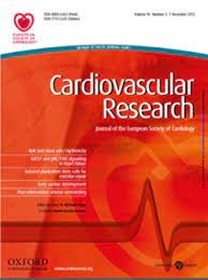从性激素减少到激素治疗:随年龄增长对心血管风险的影响。
IF 13.3
1区 医学
Q1 CARDIAC & CARDIOVASCULAR SYSTEMS
引用次数: 0
摘要
衰老在动脉功能和结构的恶化中起着至关重要的作用,显然是男性和女性心血管(CV)的首要危险因素。冠状动脉和脑动脉特别容易发生动脉粥样硬化,它们所灌注的组织特别容易发生缺血。在两性中,与年龄相关的性激素减少(更年期和男性更年期)对心血管健康有有害影响。补充激素能在多大程度上限制因年龄增长而增加的心血管风险仍存在争议。妇女健康倡议研究是评估绝经后激素治疗的获益/风险比的主要临床干预措施,该研究在2002年显示,在老年妇女(0 - 70岁)中,给予雌激素加一种特殊的合成黄体酮醋酸羟孕酮,心血管事件意外增加,而单独使用雌激素对年轻妇女(<60岁)无害,甚至有保护作用。这指出了黄体酮(现在首选天然黄体酮)和年龄的双重问题。睾酮和男性心血管疾病的临床情况尚不清楚。与这些问题相关,我们将分析和总结:(i)在人类和实验模型中雌激素和睾酮的剂量和浓度的重要性,允许在实践中定义性激素的医学调节方面的相关/生理或药理作用;(ii)雌激素或雄激素在心血管保护方面的主要临床研究,以及年龄对这些作用的影响;(iii)这些行动背后的机制;(iv)性别确认激素治疗,因为这些性激素是性别转换护理管理的基石。本文章由计算机程序翻译,如有差异,请以英文原文为准。
From sex hormone decrease to hormonal treatment: impacts on cardiovascular risk with ageing.
Ageing plays a critical role in the deterioration of artery function and structure, and clearly represents the first cardiovascular (CV) risk factor in men but also in women. Coronary and cerebral arteries are particularly prone to atheroma, and the tissues they perfuse are particularly vulnerable to ischaemia. In both sexes, the age-related decrease in sex hormones (menopause and andropause) has deleterious effects on CV health. The extent to which hormonal supplementation can limit the CV risks increased by ageing remains controversial. The Women Health Initiative study, the main clinical intervention designed to evaluate the benefit/risk ratio of hormone treatment after menopause, revealed in 2002 an unexpected increase in CV events in aged women (>70 years) given estrogens plus a peculiar synthetic progestin medroxyprogesterone acetate, whereas estrogens alone were not harmful but even protective in younger women (<60 years). This pointed out the double problem of the progestin (now natural progesterone is preferred) and of the age. The clinical situation is not yet clear for testosterone and CV disease in men. Related to these questions, we will analyse and summarize: (i) the importance of the doses and concentrations of estrogens and testosterone, both in humans and in experimental models, allowing to define relevant/physiological or pharmacological actions of sex hormones in respect to their medical modulations in practice; (ii) the main clinical studies conducted with estrogens or androgens, in terms of CV protection and the impact of age on these effects; (iii) the mechanisms underlying these actions; (iv) the gender-affirming hormone therapy, as these sex hormones are the cornerstone of gender transition care management.
求助全文
通过发布文献求助,成功后即可免费获取论文全文。
去求助
来源期刊

Cardiovascular Research
医学-心血管系统
CiteScore
21.50
自引率
3.70%
发文量
547
审稿时长
1 months
期刊介绍:
Cardiovascular Research
Journal Overview:
International journal of the European Society of Cardiology
Focuses on basic and translational research in cardiology and cardiovascular biology
Aims to enhance insight into cardiovascular disease mechanisms and innovation prospects
Submission Criteria:
Welcomes papers covering molecular, sub-cellular, cellular, organ, and organism levels
Accepts clinical proof-of-concept and translational studies
Manuscripts expected to provide significant contribution to cardiovascular biology and diseases
 求助内容:
求助内容: 应助结果提醒方式:
应助结果提醒方式:


